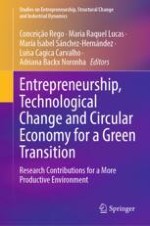This book is a comprehensive and timely publication that aims to be an essential reference source, building on contemporary research in the fields of circular economy and green transition in relation to entrepreneurship and technological change. This book aims to address a range of approaches including, but not limited to, the conceptual, theoretical, and case studies related to the topics of the book. The topical focus is on how circular economy contributions, energy infrastructure, green transition, and digital transformation are contributing to attaining the Sustainable Development Goals (SDGs). The expert contributions in the book particularly help us learn more about the answers to the current challenges of the green transition as well as how the necessary technological change will impact, mainly, the enterprises and the field of agriculture production and agribusiness.
The book is mainly intended to support an academic audience (academics, university teachers, researchers, and post-graduate students – both Master's and Doctorate levels). In addition, this book will be of benefit to institutional experts, developers, and researchers in the fields of Entrepreneurship and technological change in circular economy and green transition.
